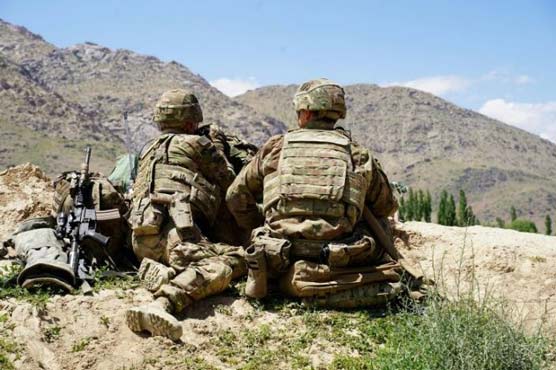Coronavirus challenges US military machine

Coronavirus challenges US military machine
WASHINGTON (AFP) - The US retreat from Afghanistan is delayed, troops have pulled back from Iraq, crucial readiness exercises are cancelled, and soldiers are confined to bases: coronavirus is handicapping the world s most powerful military.
The Pentagon this week admitted that the global pandemic is a formidable foe like none other that it has confronted.
Proud of its ability to project force to the furthest corners of the globe and to react instantly to any threat, the US military has been forced to curb operations and promote social distancing to ensure its two million-plus active and reserve fighting force, along with hundreds of thousands of civilian employees, stay healthy.
The usually crowded halls of the Pentagon have thinned, with thousands told to work from home -- a shift that has introduced new security challenges.
Secretary of Defense Mark Esper and his deputy secretary, David Norquist, and their staffs are no longer meeting in person, to ensure at least one national leader and his team stays healthy.
Redeploying
Despite dozens of coronavirus cases striking military personnel on bases and at least three on naval ships, Esper said this week that there was no reduction in the readiness of US troops to respond to threats.
"Mission number one for the United States military remains ensuring that the American people, the country and our interests abroad are protected. I can assure the American people we are well on top of that," he said on Fox News.
But regular operations have been disrupted.
The Central Command, which oversees operations in the Middle East, said it is "redeploying" troops from Iraq and Syria.
"To prevent potential spread of COVID-19, the Iraqi Security Forces have suspended all training. As a result, the Coalition will temporarily return some of its training-focused forces to their own countries in the coming days and weeks," Centcom said in a statement.
Centcom also pulled back troops from some of the smaller bases in Iraq, where they were more vulnerable to the recent rocket attacks by militias.
Even as they continue the fight against the Islamic State group, "looking ahead, we anticipate the Coalition supporting the Iraqi Security Forces from fewer bases with fewer people," they said.
On the other hand, in Afghanistan, where the United States has committed to withdrawing some 5,000 troops in the near term as part of the peace deal with the Taliban, troop movements have halted.
The Pentagon does not want to risk moving people around the world in ways that could increase COVID-19 infections.
"To preserve our currently healthy force, Resolute Support is making the necessary adjustments to temporarily pause personnel movement into theater," said General Austin Miller, US forces commander in Afghanistan.
War games cancelled
Esper has also been forced to suspend key joint exercises and war games in South Korea, Africa and elsewhere.
On March 11, the Pentagon decided to slash its participation in what would have been the largest joint US-Europe war games in 25 years, the Defender-Europe 20 exercise.
The US military was to send more than 20,000 soldiers to Europe to take part.
The exercise will go ahead, but has now been cut by more than half, according to Army Secretary Ryan McCarthy.
At its hundreds of military bases across the country and around the world, US forces are prevented from traveling and outsiders are carefully screened before being allowed entry.
Soldiers, sailors, and airmen remain living in close quarters, and Esper said they will continue to hold large gatherings for training as needed "at this time," Esper said this week.
"I trust the commanders to lead their units and take care of them appropriately," he said.
"My view is the commanders have the authorities they need to take whatever precautions, while at the same time ensuring the readiness of the troops and the capabilities of our formations."
Travel between bases, domestically and internationally, has nevertheless been banned, even for family visits.
Enemies affected
Also hobbled: the recruitment of new troops, an activity that normally accelerates at this time of year as students near the completion of their studies.
"We are going to, basically, virtual recruiting," said General James McConville, the Army chief of staff.
"Much of that is done on social media and that allows us to protect our soldiers and also protect the new recruits," he said.
While clearly constrained by the pandemic, the Pentagon has played down its impact, noting that its adversaries face the same challenge.
"They re very, very concerned about this virus also in Iraq, in Afghanistan, certainly in Iran," said McConville.
"And that s affecting everyone s operations."

